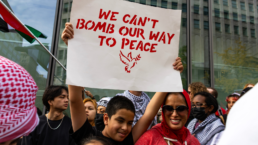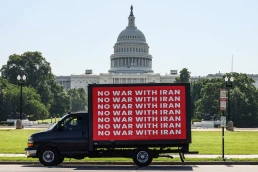For any peace movement, figuring out how to approach Trump will be like shadowboxing—trying to imagine what position he’s likely to take next.
By William Hartung, LA Progressive
When the election results came in on November 4th, I felt a pain in the pit of my stomach, similar to what I experienced when Ronald Reagan rode to power in 1980, or with George W. Bush’s tainted victory over Al Gore in 2000. After some grieving, the first question that came to my mind was: What will a Trump presidency mean for the movements for peace and social justice? I offer what follows as just one person’s view, knowing that a genuine strategy for coping in this new era will have to be a distinctly collective process.
As a start, history offers some inspiration. On issues of war and peace, the trajectory of the Reagan administration suggests how surprising hope can prove to be. The man who joked that “we begin bombing [Russia] in five minutes,” and hired a Pentagon official who told journalist Robert Scheer that America would survive a nuclear war if it had “enough shovels” to build makeshift shelters, ended up claiming that “a nuclear war cannot be won and must never be fought.” He even came tantalizingly close to an agreement with Soviet leader Mikhail Gorbachev to abolish nuclear weapons altogether.

To his credit, Reagan developed a visceral opposition to such weaponry, while his wife, Nancy, urged him to reduce nuclear weapons as a way to burnish his legacy. A Washington Post account of her role noted that “[s]he made no secret of her dream that a man once branded as a cowboy and a jingoist might even win the Nobel Peace Prize.” Such personal factors did come into play, but the primary driver of Reagan’s change of heart was the same thing that undergirds so many significant changes in public policy—dedicated organizing and public pressure.
Reagan’s presidency coincided with the rise of the largest, most mainstream anti-nuclear movement in American history, the nuclear freeze campaign.
Along the way, in June 1982, one million people rallied for disarmament in New York’s Central Park. And that movement had an impact. As Reagan National Security Advisor Robert MacFarlane pointed out at the time, “We took it [the freeze campaign] as a serious movement that could undermine congressional support for the [nuclear] modernization program, and potentially… a serious partisan political threat that could affect the election in `84.”
Recent Posts
A War With Iran Would Not Be a One-Off Event But a Disastrous Ongoing Rupture
February 26, 2026
Take Action Now If Congress cedes its power to stop a war with Iran, it will fully erode any lingering promise of democratic restraint.By Hanieh…
New Addition to List of Nuclear Near Catastrophes
February 25, 2026
Take Action Now Debris flew for great distances — many times the distance of 270 meters to a nuclear reactor and nuclear storage facility.By David…
Gavin Newsom’s last budget belies his ‘California for All’ pledge
February 24, 2026
Take Action Now Yet, even as the state is poised to lose billions in federal funding, and millions of Californians are losing access to health care…
Israel and American Hawks are Pushing U.S. to Iran War With Catastrophic Consequences
February 23, 2026
Take Action Now At the World Health Assembly in May, member states may endorse an unprecedented strategy declaring that health is not a cost – but…




